- Home
- Alexandre Dumas
Vingt ans après. English Page 18
Vingt ans après. English Read online
Page 18
18. Grimaud begins his Functions.
Grimaud thereupon presented himself with his smooth exterior at thedonjon of Vincennes. Now Monsieur de Chavigny piqued himself on hisinfallible penetration; for that which almost proved that he was the sonof Richelieu was his everlasting pretension; he examined attentively thecountenance of the applicant for place and fancied that the contractedeyebrows, thin lips, hooked nose, and prominent cheek-bones of Grimaudwere favorable signs. He addressed about twelve words to him; Grimaudanswered in four.
"Here's a promising fellow and it is I who have found out his merits,"said Monsieur de Chavigny. "Go," he added, "and make yourself agreeableto Monsieur la Ramee, and tell him that you suit me in all respects."
Grimaud had every quality that could attract a man on duty who wishes tohave a deputy. So, after a thousand questions which met with only a wordin reply, La Ramee, fascinated by this sobriety in speech, rubbed hishands and engaged Grimaud.
"My orders?" asked Grimaud.
"They are these; never to leave the prisoner alone; to keep away fromhim every pointed or cutting instrument, and to prevent his conversingany length of time with the keepers."
"Those are all?" asked Grimaud.
"All now," replied La Ramee.
"Good," answered Grimaud; and he went right to the prisoner.
The duke was in the act of combing his beard, which he had allowed togrow, as well as his hair, in order to reproach Mazarin with hiswretched appearance and condition. But having some days previously seenfrom the top of the donjon Madame de Montbazon pass in her carriage, andstill cherishing an affection for that beautiful woman, he did not wishto be to her what he wished to be to Mazarin, and in the hope of seeingher again, had asked for a leaden comb, which was allowed him. The combwas to be a leaden one, because his beard, like that of most fairpeople, was rather red; he therefore dyed it thus whilst combing it.
As Grimaud entered he saw this comb on the tea-table; he took it up, andas he took it he made a low bow.
The duke looked at this strange figure with surprise. The figure put thecomb in its pocket.
"Ho! hey! what's that?" cried the duke. "Who is this creature?"
Grimaud did not answer, but bowed a second time.
"Art thou dumb?" cried the duke.
Grimaud made a sign that he was not.
"What art thou, then? Answer! I command thee!" said the duke.
"A keeper," replied Grimaud.
"A keeper!" reiterated the duke; "there was nothing wanting in mycollection, except this gallows-bird. Halloo! La Ramee! some one!"
La Ramee ran in haste to obey the call.
"Who is this wretch who takes my comb and puts it in his pocket?" askedthe duke.
"One of your guards, my prince; a man of talent and merit, whom you willlike, as I and Monsieur de Chavigny do, I am sure."
"Why does he take my comb?"
"Why do you take my lord's comb?" asked La Ramee.
Grimaud drew the comb from his pocket and passing his fingers over thelargest teeth, pronounced this one word, "Pointed."
"True," said La Ramee.
"What does the animal say?" asked the duke.
"That the king has forbidden your lordship to have any pointedinstrument."
"Are you mad, La Ramee? You yourself gave me this comb."
"I was very wrong, my lord, for in giving it to you I acted inopposition to my orders."
The duke looked furiously at Grimaud.
"I perceive that this creature will be my particular aversion," hemuttered.
Grimaud, nevertheless, was resolved for certain reasons not at once tocome to a full rupture with the prisoner; he wanted to inspire, not asudden repugnance, but a good, sound, steady hatred; he retired,therefore, and gave place to four guards, who, having breakfasted, couldattend on the prisoner.
A fresh practical joke now occurred to the duke. He had asked forcrawfish for his breakfast on the following morning; he intended to passthe day in making a small gallows and hang one of the finest of thesefish in the middle of his room--the red color evidently conveying anallusion to the cardinal--so that he might have the pleasure of hangingMazarin in effigy without being accused of having hung anything moresignificant than a crawfish.
The day was employed in preparations for the execution. Every one growschildish in prison, but the character of Monsieur de Beaufort wasparticularly disposed to become so. In the course of his morning's walkhe collected two or three small branches from a tree and found a smallpiece of broken glass, a discovery that quite delighted him. When hecame home he formed his handkerchief into a loop.
Nothing of all this escaped Grimaud, but La Ramee looked on with thecuriosity of a father who thinks that he may perhaps get a cheap ideaconcerning a new toy for his children. The guards looked on it withindifference. When everything was ready, the gallows hung in the middleof the room, the loop made, and when the duke had cast a glance upon theplate of crawfish, in order to select the finest specimen among them, helooked around for his piece of glass; it had disappeared.
"Who has taken my piece of glass?" asked the duke, frowning. Grimaudmade a sign to denote that he had done so.
"What! thou again! Why didst thou take it?"
"Yes--why?" asked La Ramee.
Grimaud, who held the piece of glass in his hand, said: "Sharp."
"True, my lord!" exclaimed La Ramee. "Ah! deuce take it! we have aprecious fellow here!"
"Monsieur Grimaud!" said the duke, "for your sake I beg of you, nevercome within the reach of my fist!"
"Hush! hush!" cried La Ramee, "give me your gibbet, my lord. I willshape it out for you with my knife."
And he took the gibbet and shaped it out as neatly as possible.
"That's it," said the duke, "now make me a little hole in the floorwhilst I go and fetch the culprit."
La Ramee knelt down and made a hole in the floor; meanwhile the dukehung the crawfish up by a thread. Then he placed the gibbet in themiddle of the room, bursting with laughter.
La Ramee laughed also and the guards laughed in chorus; Grimaud,however, did not even smile. He approached La Ramee and showing him thecrawfish hung up by the thread:
"Cardinal," he said.
"Hung by order of his Highness the Duc de Beaufort!" cried the prisoner,laughing violently, "and by Master Jacques Chrysostom La Ramee, theking's commissioner."
La Ramee uttered a cry of horror and rushed toward the gibbet, which hebroke at once and threw the pieces out of the window. He was going tothrow the crawfish out also, when Grimaud snatched it from his hands.
"Good to eat!" he said, and put it in his pocket.
This scene so enchanted the duke that at the moment he forgave Grimaudfor his part in it; but on reflection he hated him more and more, beingconvinced he had some evil motive for his conduct.
But the story of the crab made a great noise through the interior of thedonjon and even outside. Monsieur de Chavigny, who at heart detested thecardinal, took pains to tell the story to two or three friends, who putit into immediate circulation.
The prisoner happened to remark among the guards one man with a verygood countenance; and he favored this man the more as Grimaud became themore and more odious to him. One morning he took this man on one sideand had succeeded in speaking to him, when Grimaud entered and seeingwhat was going on approached the duke respectfully, but took the guardby the arm.
"Go away," he said.
The guard obeyed.
"You are insupportable!" cried the duke; "I shall beat you."
Grimaud bowed.
"I will break every bone in your body!" cried the duke.
Grimaud bowed, but stepped back.
"Mr. Spy," cried the duke, more and more enraged, "I will strangle youwith my own hands."
And he extended his hands toward Grimaud, who merely thrust the guardout and shut the door behind him. At the same time he felt the duke'sarms on his shoulders like two iron claws; but instead either of callingout or defending hi
mself, he placed his forefinger on his lips and saidin a low tone:
"Hush!" smiling as he uttered the word.
A gesture, a smile and a word from Grimaud, all at once, were so unusualthat his highness stopped short, astounded.
Grimaud took advantage of that instant to draw from his vest a charminglittle note with an aristocratic seal, and presented it to the dukewithout a word.
The duke, more and more bewildered, let Grimaud loose and took the note.
"From Madame de Montbazon?" he cried.
Grimaud nodded assent.
The duke tore open the note, passed his hands over his eyes, for he wasdazzled and confused, and read:
"My Dear Duke,--You may entirely confide in the brave lad who will giveyou this note; he has consented to enter the service of your keeper andto shut himself up at Vincennes with you, in order to prepare and assistyour escape, which we are contriving. The moment of your deliverance isat hand; have patience and courage and remember that in spite of timeand absence all your friends continue to cherish for you the sentimentsthey have so long professed and truly entertained.
"Yours wholly and most affectionately
"Marie de Montbazon.
"P.S.--I sign my full name, for I should be vain if I could suppose thatafter five years of absence you would remember my initials."
The poor duke became perfectly giddy. What for five years he had beenwanting--a faithful servant, a friend, a helping hand--seemed to havefallen from Heaven just when he expected it the least.
"Oh, dearest Marie! she thinks of me, then, after five years ofseparation! Heavens! there is constancy!" Then turning to Grimaud, hesaid:
"And thou, my brave fellow, thou consentest thus to aid me?"
Grimaud signified his assent.
"And you have come here with that purpose?"
Grimaud repeated the sign.
"And I was ready to strangle you!" cried the duke.
Grimaud smiled.
"Wait, then," said the duke, fumbling in his pocket. "Wait," hecontinued, renewing his fruitless search; "it shall not be said thatsuch devotion to a grandson of Henry IV. went without recompense."
The duke's endeavors evinced the best intention in the world, but one ofthe precautions taken at Vincennes was that of allowing prisoners tokeep no money. Whereupon Grimaud, observing the duke's disappointment,drew from his pocket a purse filled with gold and handed it to him.
"Here is what you are looking for," he said.
The duke opened the purse and wanted to empty it into Grimaud's hands,but Grimaud shook his head.
"Thank you, monseigneur," he said, drawing back; "I am paid."
The duke went from one surprise to another. He held out his hand.Grimaud drew near and kissed it respectfully. The grand manner of Athoshad left its mark on Grimaud.
"What shall we do? and when? and how proceed?"
"It is now eleven," answered Grimaud. "Let my lord at two o'clock askleave to make up a game at tennis with La Ramee and let him send two orthree balls over the ramparts."
"And then?"
"Your highness will approach the walls and call out to a man who worksin the moat to send them back again."
"I understand," said the duke.
Grimaud made a sign that he was going away.
"Ah!" cried the duke, "will you not accept any money from me?"
"I wish my lord would make me one promise."
"What! speak!"
"'Tis this: when we escape together, that I shall go everywhere and bealways first; for if my lord should be overtaken and caught, there'severy chance of his being brought back to prison, whereas if I am caughtthe least that can befall me is to be--hung."
"True, on my honor as a gentleman it shall be as thou dost suggest."
"Now," resumed Grimaud, "I've only one thing more to ask--that yourhighness will continue to detest me."
"I'll try," said the duke.
At this moment La Ramee, after the interview we have described with thecardinal, entered the room. The duke had thrown himself, as he was wontto do in moments of dullness and vexation, on his bed. La Ramee cast aninquiring look around him and observing the same signs of antipathybetween the prisoner and his guardian he smiled in token of his inwardsatisfaction. Then turning to Grimaud:
"Very good, my friend, very good. You have been spoken of in a promisingquarter and you will soon, I hope, have news that will be agreeable toyou."
Grimaud saluted in his politest manner and withdrew, as was his customon the entrance of his superior.
"Well, my lord," said La Ramee, with his rude laugh, "you still setyourself against this poor fellow?"
"So! 'tis you, La Ramee; in faith, 'tis time you came back again. Ithrew myself on the bed and turned my nose to the wall, that I mightn'tbreak my promise and strangle Grimaud."
"I doubt, however," said La Ramee, in sprightly allusion to the silenceof his subordinate, "if he has said anything disagreeable to yourhighness."
"Pardieu! you are right--a mute from the East! I swear it was time foryou to come back, La Ramee, and I was eager to see you again."
"Monseigneur is too good," said La Ramee, flattered by the compliment.
"Yes," continued the duke, "really, I feel bored today beyond the powerof description."
"Then let us have a match in the tennis court," exclaimed La Ramee.
"If you wish it."
"I am at your service, my lord."
"I protest, my dear La Ramee," said the duke, "that you are a charmingfellow and that I would stay forever at Vincennes to have the pleasureof your society."
"My lord," replied La Ramee, "I think if it depended on the cardinalyour wishes would be fulfilled."
"What do you mean? Have you seen him lately?"
"He sent for me to-day."
"Really! to speak to you about me?"
"Of what else do you imagine he would speak to me? Really, my lord, youare his nightmare."
The duke smiled with bitterness.
"Ah, La Ramee! if you would but accept my offers! I would make yourfortune."
"How? you would no sooner have left prison than your goods would beconfiscated."
"I shall no sooner be out of prison than I shall be master of Paris."
"Pshaw! pshaw! I cannot hear such things said as that; this is a fineconversation with an officer of the king! I see, my lord, I shall beobliged to fetch a second Grimaud!"
"Very well, let us say no more about it. So you and the cardinal havebeen talking about me? La Ramee, some day when he sends for you, youmust let me put on your clothes; I will go in your stead; I willstrangle him, and upon my honor, if that is made a condition I willreturn to prison."
"Monseigneur, I see well that I must call Grimaud."
"Well, I am wrong. And what did the cuistre [pettifogger] say about me?"
"I admit the word, monseigneur, because it rhymes with ministre[minister]. What did he say to me? He told me to watch you."
"And why so? why watch me?" asked the duke uneasily.
"Because an astrologer had predicted that you would escape."
"Ah! an astrologer predicted that?" said the duke, starting in spite ofhimself.
"Oh, mon Dieu! yes! those imbeciles of magicians can only imagine thingsto torment honest people."
"And what did you reply to his most illustrious eminence?"
"That if the astrologer in question made almanacs I would advise him notto buy one."
"Why not?"
"Because before you could escape you would have to be turned into abird."
"Unfortunately, that is true. Let us go and have a game at tennis, LaRamee."
"My lord--I beg your highness's pardon--but I must beg for half anhour's leave of absence."
"Why?"
"Because Monseigneur Mazarin is a prouder man than his highness, thoughnot of such high birth: he forgot to ask me to breakfast."
"Well, shall I send for some breakfast here?"
"No, my lord; I must tell you that th
e confectioner who lived oppositethe castle--Daddy Marteau, as they called him----"
"Well?"
"Well, he sold his business a week ago to a confectioner from Paris, aninvalid, ordered country air for his health."
"Well, what have I to do with that?"
"Why, good Lord! this man, your highness, when he saw me stop before hisshop, where he has a display of things which would make your mouthwater, my lord, asked me to get him the custom of the prisoners in thedonjon. 'I bought,' said he, 'the business of my predecessor on thestrength of his assurance that he supplied the castle; whereas, on myhonor, Monsieur de Chavigny, though I've been here a week, has notordered so much as a tartlet.' 'But,' I then replied, 'probably Monsieurde Chavigny is afraid your pastry is not good.' 'My pastry not good!Well, Monsieur La Ramee, you shall judge of it yourself and at once.' 'Icannot,' I replied; 'it is absolutely necessary for me to return to thechateau.' 'Very well,' said he, 'go and attend to your affairs, sinceyou seem to be in a hurry, but come back in half an hour.' 'In half anhour?' 'Yes, have you breakfasted?' 'Faith, no.' 'Well, here is a patethat will be ready for you, with a bottle of old Burgundy.' So, you see,my lord, since I am hungry, I would, with your highness's leave----" AndLa Ramee bent low.
"Go, then, animal," said the duke; "but remember, I only allow you halfan hour."
"May I promise your custom to the successor of Father Marteau, my lord?"
"Yes, if he does not put mushrooms in his pies; thou knowest thatmushrooms from the wood of Vincennes are fatal to my family."
La Ramee went out, but in five minutes one of the officers of the guardentered in compliance with the strict orders of the cardinal that theprisoner should never be left alone a moment.
But during these five minutes the duke had had time to read again thenote from Madame de Montbazon, which proved to the prisoner that hisfriends were concerting plans for his deliverance, but in what way heknew not.
But his confidence in Grimaud, whose petty persecutions he now perceivedwere only a blind, increased, and he conceived the highest opinion ofhis intellect and resolved to trust entirely to his guidance.

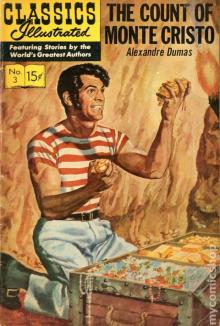 The Count of Monte Cristo, Illustrated
The Count of Monte Cristo, Illustrated Knight of Maison-Rouge
Knight of Maison-Rouge![The Three Musketeers - Alexandre Dumas - [Full Version] - (ANNOTATED) Read online](http://i1.bookreadfree.com/14/the_three_musketeers_-_alexandre_dumas_-_[full_version]_-_annotated_preview.jpg) The Three Musketeers - Alexandre Dumas - [Full Version] - (ANNOTATED)
The Three Musketeers - Alexandre Dumas - [Full Version] - (ANNOTATED)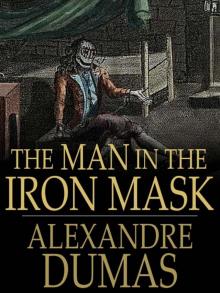 The Man in the Iron Mask
The Man in the Iron Mask The Count of Monte Cristo (Penguin Classics eBook)
The Count of Monte Cristo (Penguin Classics eBook) Count of Monte Cristo (abridged) (Barnes & Noble Classics Series)
Count of Monte Cristo (abridged) (Barnes & Noble Classics Series) The Women's War
The Women's War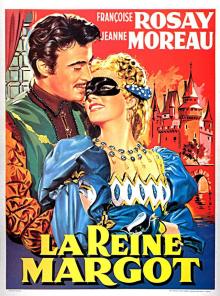 La reine Margot. English
La reine Margot. English The Vicomte de Bragelonne
The Vicomte de Bragelonne__english_preview.jpg) La dame aux camélias (Novel). English
La dame aux camélias (Novel). English The Count of Monte Cristo
The Count of Monte Cristo Balsamo, the Magician; or, The Memoirs of a Physician
Balsamo, the Magician; or, The Memoirs of a Physician Ten Years Later
Ten Years Later The Romance of Violette
The Romance of Violette The Mesmerist's Victim
The Mesmerist's Victim Vingt ans après. English
Vingt ans après. English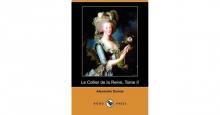 Le collier de la reine. English
Le collier de la reine. English Taking the Bastile; Or, Pitou the Peasant
Taking the Bastile; Or, Pitou the Peasant The Hero of the People: A Historical Romance of Love, Liberty and Loyalty
The Hero of the People: A Historical Romance of Love, Liberty and Loyalty Louise de la Valliere
Louise de la Valliere Les Quarante-cinq. English
Les Quarante-cinq. English Ange Pitou (Volume 1)
Ange Pitou (Volume 1) The Royal Life Guard; or, the flight of the royal family.
The Royal Life Guard; or, the flight of the royal family. Les trois mousquetaires. English
Les trois mousquetaires. English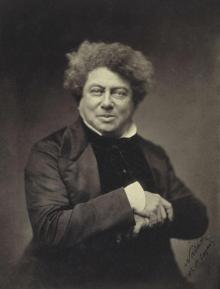 Une fille du régent. English
Une fille du régent. English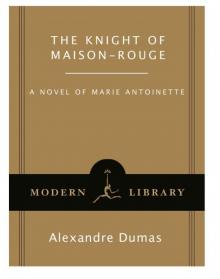 The Knight of Maison-Rouge
The Knight of Maison-Rouge The Count of Monte Cristo (Unabridged Penguin)
The Count of Monte Cristo (Unabridged Penguin) Ange Pitou
Ange Pitou The Romance of Violette (vintage erotica)
The Romance of Violette (vintage erotica) The Three Musketeers
The Three Musketeers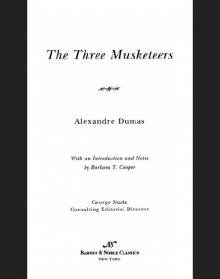 Three Musketeers (Barnes & Noble Classics Series)
Three Musketeers (Barnes & Noble Classics Series) Georges
Georges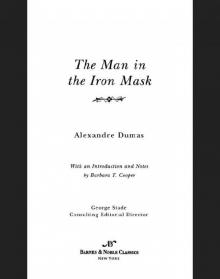 Man in the Iron Mask (Barnes & Noble Classics Series)
Man in the Iron Mask (Barnes & Noble Classics Series) The Red Sphinx
The Red Sphinx